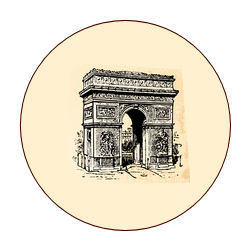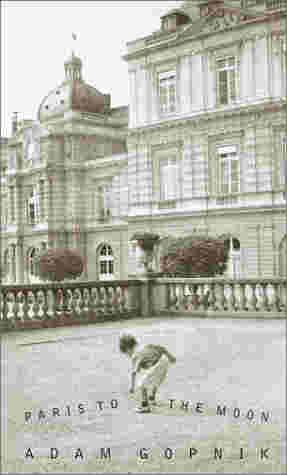|
Paris to the Moon
by Adam Gopnik
 Paris to the Moon Paris to the Moon
About the Book
Paris. The name alone conjures images of chestnut-lined boulevards, sidewalk cafés, breathtaking façades around every corner--in short, an exquisite romanticism that has captured the American imagination for as long as there have been Americans.
In 1995, Adam Gopnik, his wife, and their infant son left the familiar comforts and hassles of New York City for the urbane glamour of the City of Light. Gopnik is a longtime New Yorker writer, and the magazine has sent its writers to Paris for decades--but his was above all a personal pilgrimage to the place that had for so long been the undisputed capital of everything cultural and beautiful. It was also the opportunity to raise a child who would know what it was to romp in the Luxembourg Gardens, to enjoy a croque monsieur in a Left Bank café--a child (and perhaps a father, too) who would have a grasp of that Parisian sense of style we Americans find so elusive.
So, in the grand tradition of the American abroad, Gopnik walked the paths of the Tuileries, enjoyed philosophical discussions at his local bistro, wrote as violet twilight fell on the arrondissements. Of course, as readers of Gopnik's beloved and award-winning "Paris Journals" in The New Yorker know, there was also the matter of raising a child and carrying on with day-to-day, not-so-fabled life. Evenings with French intellectuals preceded middle-of-the-night baby feedings; afternoons were filled with trips to the Musée d'Orsay and pinball games; weekday leftovers were eaten while three-star chefs debated a "culinary crisis."
As Gopnik describes in this funny and tender book, the dual processes of navigating a foreign city and becoming a parent are not completely dissimilar journeys--both hold new routines, new languages, a new set of rules by which everyday life is lived. With singular wit and insight, Gopnik weaves the magical with the mundane in a wholly delightful, often hilarious look at what it was to be an American family man in Paris at the end of the twentieth century. "We went to Paris for a sentimental reeducation-I did anyway-even though the sentiments we were instructed in were not the ones we were expecting to learn, which I believe is why they call it an education."
About the Author
Adam Gopnik author page at Amazon.com.
Reviews
Amazon.com Review: In 1995 Gopnik was offered the plush assignment of writing the "Paris Journals" for the New Yorker. He spent five years in Paris with his wife, Martha, and son, Luke, writing dispatches now collected here along with previously unpublished journal entries. A self-described "comic-sentimental essayist," Gopnik chose the romance of Paris in its particulars as his subject. Gopnik falls in unabashed love with what he calls Paris's commonplace civilization--the cafés, the little shops, the ancient carousel in the park, and the small, intricate experiences that happen in such settings. But Paris can also be a difficult city to love, particularly its pompous and abstract official culture with its parallel paper universe. The tension between these two sides of Paris and the country's general brooding over the decline of French dominance in the face of globalization (haute couture, cooking, and sex, as well as the economy, are running deficits) form the subtexts for these finely wrought and witty essays. With his emphasis on the micro in the macro, Gopnik describes trying to get a Thanksgiving turkey delivered during a general strike and his struggle to find an apartment during a government scandal over favoritism in housing allocations. The essays alternate between reports of national and local events and accounts of expatriate family life, with an emphasis on "the trinity of late-century bourgeois obsessions: children and cooking and spectator sports, including the spectator sport of shopping." Gopnik describes some truly delicious moments, from the rites of Parisian haute couture, to the "occupation" of a local brasserie in protest of its purchase by a restaurant tycoon, to the birth of his daughter with the aid of a doctor in black jeans and a black silk shirt, open at the front. Gopnik makes terrific use of his status as an observer on the fringes of fashionable society to draw some deft comparisons between Paris and New York ("It is as if all American appliances dreamed of being cars while all French appliances dreamed of being telephones") and do some incisive philosophizing on the nature of both. This is masterful reportage with a winning infusion of intelligence, intimacy, and charm.—Lesley Reed
See more reviews at right.

|
 
Reviews (continued from left)
From Publishers Weekly:
In this collection of 23 essays and journal entries, many of which were originally published in the New Yorker, Gopnik chronicles the time he spent in Paris between 1995 and 2000. Although his subjects are broadDglobal capitalism, American economic hegemony, France's declining role in the worldDhe approaches each one via the tiny, personal details of his life as a married expatriate with a small child. In one essay, he deftly reveals the dynamics of France's 1995 general strike by recounting his ordeal buying a Thanksgiving turkey from the localDstrikingDr tisseur. In "The Rules of the Sport," he explores the maddening, hilarious intricacies of French bureaucracy by way of a so-called New York-style gym, where his efforts to become a member encounter a wall of meetings, physical examinations and paperwork. Many of the entries, such as "The Fall of French Cooking," focus on how Paris is coping with the loss of its cultural might, and look at others of the inexorable changes brought on by global capitalism. "The Balzar Wars" describes a mini-revolt staged by a group of Parisians (including the author) when their local, family-owned brasserie is purchased by a restaurant tycoon. Throughout, Gopnik is unabashedly sentimental about Paris, yet he never loses the objectivity of his outsider's eye. His "macro in the micro" style sometimes seems a convenient excuse to write about himself, but elegantly woven together with the larger issues facing France, those personal observations beautifully convey a vision of Paris and its prideful, abstract-thinking, endlessly fascinating inhabitants. Although the core readership for this book will most likely be loyal New Yorker subscribers, its thoughtful, funny portrayal of French life give it broad appeal to Francophiles unfamiliar with Gopnik's work.
|

